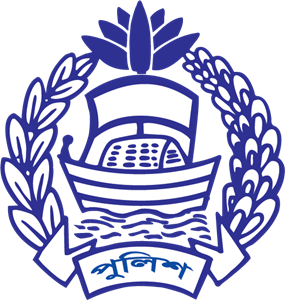Bangladesh Police 2023

প্রতিষ্ঠানের নাম:
Bangladesh Police
সংক্ষিপ্ত নাম:
TRC
আবেদন শুরুর তারিখ:
22 ডিসেম্বর, 2022
আবেদনের শেষ তারিখ:
29 জানুয়ারি, 2023
অবস্থা:
চলমান
বিজ্ঞপ্তির নং:
N/A
ওয়েব লিংক:
সরকারি চাকরি
বিজ্ঞপ্তির বিবরণ:
চাকরির উৎস https://www.police.gov.bd/
প্রকাশের তারিখ: 22 ডিসেম্বর, 2022
শেষ তারিখ: 29 জানুয়ারি, 2023
প্রতিষ্ঠানের তথ্য
প্রতিষ্ঠানের নাম: Bangladesh Police
সংক্ষিপ্ত নাম: TRC
বিস্তারিত দেখুন: The Bangladesh Police (Bengali: বাংলাদেশ পুলিশ) of the People's Republic of Bangladesh is a law enforcement agency, operating under the Ministry of Home Affairs.[4] It plays a crucial role in maintaining peace, and enforcement of law and order within Bangladesh. Though the police are primarily concerned with the maintenance of law and order and security of persons and property of individuals, they also play a big role in the criminal justice system.[5][6] Bangladesh police played an important role during the Bangladesh's liberation war. History Medieval period Details of policing activities during the middle age are challenging to find. However, during the periods of the great sultans, an official holding the position of Muhtasib used to perform the duties of policing. This person was the chief of police, in charge of public works, and the inspector of public ethics simultaneously. In urban areas, Kotwals were responsible for performing police duties. The policing system introduced by Sher Shah Suri was further organised during the period of Emperor Akbar: the Emperor organised his administrative structure introducing Fouzdari (the principal representative of the Emperor), Mir Adal and Kazi (the head of judicial department), and Kotwal (the chief police official of larger cities). This system was effective in maintaining the law and order in cities, and was implemented in Dhaka. Many district sadar police stations are still called Kotwali police stations. In the Mughal period, Kotwal emerged as an institution. A Fouzdar was appointed to every administrative unit of the government (district), under whom there were some artillery and cavalry forces. There was a disciplined police system during the Mughal period, though there was no professional police force like that in the British period. British period [1857 - 1947] In the early stage of the Industrial Revolution, when England was facing grave crisis due to socio-economic transformation, the necessity of an effective organised police service was keenly felt. Sir Robert Peel, then the Prime Minister, introduced a bill in the British Parliament in 1829 which created an organised civil police in London. The success of the London police in controlling social disorder and crime was admired by not only the people of England but also of European and American countries: New York city copied the London model with some modifications when it organised the first Municipal Police Force, in 1833.[7] In 1858, full control of the Indian Territory was taken over from the East India Company by the British government. The success of the London police organised under Peel's Act of 1829 prompted the British government to reform the police system in the sub-continent in a similar way to British constabularies. With this end in view, a police commissioner was set up 1840, and on the recommendation of the commission of the Police Act (Act V of 1861), was passed by the British Parliament. Under this Act a police force was created in each province of British India, and placed under the control of the provincial government. The administration of the police force of a province was vested upon an officer styled as the Inspector-general of police. The administration of the police in a district was placed under the Superintendent of Police. The Act is still in force throughout the sub-continent, and regulates the function of police in Bangladesh, as well as the other countries of the sub-continent.[7] Pakistan period [1947 - 1970] After partition of the sub-continent in 1947, the police force in Bangladesh was first named as the East Bengal Police, and then as the East Pakistan Police; however, it continued to function on the same lines as during the British rule.[8] Role in Liberation War [1971] In the Bangladesh Liberation War, Bengali-speaking police officers participated with the citizens, leading to deaths from most ranks, fighting with .303 rifles against the Pakistani. The resistance by the Bengali members of police at Rajarbagh is considered the first chapter of armed struggles during the Bangladesh Liberation war.[9][10] Bangladesh Police founded a Liberation War Museum at the Rajarbagh police line in January 2017.[11] Bangladesh period [1971 - present] After the emergence of Bangladesh as an independent country on 16 December 1971, the police force was recognised and assumed the role of a national police force.[7] In January 2004, the Bangladesh Nationalist Party led government removed the boat from the police force badge because the boat is also the symbol of the then opposition party, Bangladesh Awami League. The police had been using the boat in its symbol since the independence of Bangladesh.[12] Organisation Bangladesh Police is headed by the Inspector General of Police (IGP), under whose command, Bangladesh Police is divided into several units. Units Subnational units Range Police Metropolitan Police Specialized units Traffic Police Airport Armed Police (AAP) Diplomatic Security Division ([1]) Tourist Police (Website) Highway Police Industrial Police (IP) River Police Railway Police (GRP) (Website) Specialized Battalions Special Security and Protection Battalion (SPBn) Special Armed Force (SAF) Range Police and Range Reserve Force (RRF) Rapid Action Battalion (RAB) Armed Police Battalion (APBn) Specialized Team Special Weapons and Tactics (SWAT) Crisis Response Team (CRT) Anti-Terrorism Unit (ATU) Bomb Disposal Unit Canine Unit Institutes Police Headquarters (PHQ) Police Staff College, Bangladesh (PSC) Bangladesh Police Academy, Sarda (BPA) Police Training Centers (PTCs) Specialized Training Center like DTS/TDS/FTC/SBTS/IPTC/ITTS/Telecom TS/MDTS/PSTS etc. Intelligences Special Branch (SB) Detective Branch (DB) Counter Terrorism and Transnational Crime (CT) Police Internal Oversight (PIO) Cyber Security and Crime Division Telecommunication and Information Management (T&IM) Investigation Unit Criminal Investigation Department (CID) Police Bureau of Investigation (PBI)

.jpg)

Post a Comment